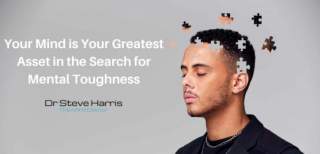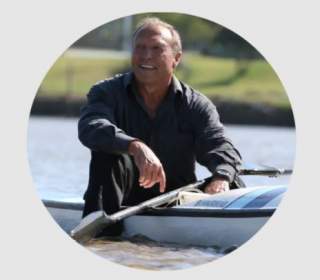Mental Toughness - Your Mind is Your Greatest Asset
The trick or secret to increasing mental toughness is that there is neither trick nor secret. Dr Steve Harris, the Mind Doctor and motivational speaker, has a healthy skepticism for anything claiming a secret. Quick fixes and oversimplified solutions to achieving success or significance insult our intelligence. Instead, he favours a planned approach by systematically practicing and scaffolding the seven mental toughness components. He firmly believes that our most tremendous potential lies in our minds and is our ultimate asset.
When we improve our mental toughness, we move away from irrational fears, illogical beliefs, destructive addictions, superstitions, and other forms of self-destruction. With mental toughness, you can consistently give your best performance, regardless of what is going on within or around you. In this way, you can become the best possible version of yourself.
A Definition of Mental Toughness
The definition of mental toughness goes beyond the limiting description of a killer instinct or a high pain and panic threshold. Dr Steve defines it as the ability to prepare for consistent performance by managing your mind so that it is not distracted and directing your energy to the right place, at the right time, for the right reason. “Strong minds suffer without complaining; weak minds complain without suffering.” - Lettie Cowman.
Signs That you are Mentally Tough
- You simultaneously have ‘fire in the belly and ice in the brain.
- You develop a self-authoring mind that balances your socially conditioned mind.
- You adapt and improve each mental toughness component by 1%.
- Your concentration is fuelled by passion leading to conditional optimism.
- Your composure transcends volatility, uncertainty, complexity, and ambiguity.
- You apply controlled aggression through increasing energy, intensity, and willpower.
- You express confidence through supreme self-belief without arrogance.
- You take calculated risks using curiosity with the courage to innovate and improvise.
- You pursue competence and wisdom through learning, unlearning, and relearning.
- You display commitment; neither trapped in gritting nor quitting – you reinvent.
- Your mental toughness mantra is "I have the capacity to absorb pain and loss, and move on.
“The resilient brain can withstand ongoing trauma, think differently, stave off brain-related illnesses including depression, and retain cognitive memory for peak performance.” (“Keep Sharp: How to Build a Better Brain at Any Age – Sanjay Gupta 2021)
Motivational Course For Corporates
Dr Steve offers a motivational course for organisational groups during these tough business conditions, which consists of ten forty-five minute modules, blending skills associated with motivation to help you discover marginal gains in your performance. These include topics such as;
- Going from fragile to agile by identifying and magnifying previously hidden personal differentiators. This enables you to accelerate ahead of current problems into a future where you are more competitive and fulfilled.
- Improving your mental and physical abilities through the application of critical thinking, holistic wellness, fostering teamwork, managing conflict and aligning your culture with the organisational culture.
- Creating new competitive advantages that help manage struggles as well as set new benchmarks through the seven components of mental toughness (concentration, composure, controlled aggression, confidence, calculated risks, competence and commitment)
Dr Steve has helped many organisations develop competitive strategic differentiators along the lines of leadership, change management, teamwork, sales, service, and wellness. Each of these is enhanced by having staff who become mentally tougher.
Contact Dr Steve Harris to find out more about his Motivational and Team Building Courses.
Surviving To Thriving - A Blue Oceans Strategy
I am using Chan Kim’s book, Blue Ocean Strategy (2005), as the framework for a surviving to thriving guide. Kim’s blue oceans’ metaphor defines a blue ocean as a less contested market space. In this space, the opposition is not as relevant, and you thrive (Kim, 2005). I believe one can apply blue ocean strategies at an individual level as well as a business one.
Kim explains that we primarily operate in highly contested Red Oceans, whereas in Blue Oceans, there is less competitor activity. He uses four quadrants to categorise what action to take to exit Red Oceans and enter Blue Oceans. I will give some of my examples of each.
The first category to get out of red oceans – eliminate
What must you eliminate to get out of red oceans? I suggest starting with energy leaks from poor wellness. Then eliminate poor customer experiences. Finally, try treating customers like VIP’s – which means treat them as they would like to be treated as opposed to the old mantra – treat them like you would like to be treated. This requires you to eliminate bureaucracy by reducing red tape and providing more red carpet.
The second category to get out of red oceans – reduce
I firstly suggest reducing judging, complaining, blaming, and gossiping. For the second point, I want to draw on the potential hazards of social media acting as an energy leak. I gleaned this from the movie “The Social Dilemma”. If we become aware of this concern associated with social media, we can save a lot of energy floundering around in red oceans and spend more accessing blue oceans. In the movie, Tristian Harris explains how our energy could get drained by the attention model used by social media sites. They use these to keep us on their site and in so doing improve their advertising revues.
Note, there is nothing intrinsically sinister with their approach; the problem lies in our lack of awareness of their ever refining, personalised algorithm to keep us mesmerised and spend more time on their social media site.
The next point to become aware of is that social media inevitably blurs facts because it has little if no editorial integrity nor sanction like an official newspaper or news channel has – of course, I acknowledge there is bias in everything we are presented in all domains, including official news outlets. They are, however, subject to rules. Therefore, know that when you are on social media sites, an algorithm is monitoring what you are interested in to feed to you reports or videos that follow a similar theme. So most things you view on, say, YouTube are suggested by the algorithm and not something you looked for in the first instance.
Once you are caught up in the flow of the algorithm – or dare I say caught up by our addictive nature, you probably experience increased anxiety, hostility, and nostalgia. You may even lose trust in science, as you reinforce your confirmation bias with “evidence” from half-truths fed to you by an algorithm that has got to know more about you than your closest friends and family know.
After a while, it is equally likely you feel enlightened and encouraged by this evidence whilst you will start considering others “sheeples” who are under the influence of an enemy like a world government, Bill Gates or any others uncovered by your social media journey.
Finally and hopefully, you become aware that it is you who may have been mind-captured and are increasingly suspending your critical thinking whilst wandering into a polarised cognitive bubble of intolerance – even willing to alienate friends, as the boundaries of your issues harden.
The third category to get to blue oceans – raise
What must you raise to enter blue oceans? My first suggestion is to improve teamwork, partnerships, and communication. Secondly, express more thankfulness, inspiration, empathy, and mental toughness. Finally, develop new knowledge and skills, e.g. including multiple perspectives and critical thinking. Innovating and improvising to do more things faster and better; becoming techno-savvy and managing the mess – not limited to your own.
The fourth category to get to blue oceans – create
To enter blue oceans, I suggest you create a strategy for surviving to thrive, e.g. one that aligns with national priorities, research, stakeholders’ problems and brings your values to life. In addition, it bonds staff into an organisational culture through its shared mission and values. It embraces multiple bottom lines, helps you flow around VUCA (Volatility, Uncertainty, Complexity and Ambiguity) and adapt faster than the opposition to a changing context. In this way, we adjust to the reality of ever-increasing instability.
It has a plan B to give you global sustainability and risk plans that cater to black swan shock events. In addition, you identify how to create stakeholder commitment to the strategic plan, accountability for results and ethical behaviour. Finally, it maintains current value (what we should do) plus imagines, then researches new ideas from which you invent new values (what we could do) with differentiators that yield unique competitive advantages.
This email address is being protected from spambots. You need JavaScript enabled to view it. and let us know if you have been mind-captured by social media feeds.
Motivational Speaker, Dr Steve Harris, has been studying performance for thirty years of which fifteen have been devoted to performance improvement through an integrated mind and body approach. Steve has the business knowledge and skills to view a wide range of problems with a perspective broader than the established patterns that entrench thinking and close minds.
Talent Management and Energy-what do they have in common?
What has Talent Management and Organisational Energy have in common?
Well, Service delivery for one thing! And Service Delivery is a Hot Topic because it impacts all of us! Organisations worldwide are currently experiencing a complex and dynamic environment in which most businesses must compete to remain sustainable. Most of these organisations realise that their competitive advantage lies within their intangible assets, namely employees (Chabault, Hulin & Soparnot, 2012; Collings & Mellahi, 2009; Kaye &Smith, 2012). Talent and brainpower are thus becoming the predominant currency in the new era of globalisation (Cheese, Thomas and Graig, 2008; Tymon, Stumpf & Doh, 2010; Sahai & Srivastava, 20
‘Act Local but think Global’ was Professor Nicolene Barkhuizens' crisp reply to my question ‘What makes this Year's Talent Blueprint Conference organised by Northwest University, Mafeking Campus so special?’
'We all aspire to Global Best Practice on Sustainable Talent Management, but each industry and organisation and even Country has its own unique challenges. We invited internationally acclaimed thought Leaders to speak at this conference like Professor Lidewey van der Linde as well as Local Experts, like Dr Lynne Derman, who is a renowned expert in the field of organisational energy and whose Doctoral Study was the first to investigate organizational energy in the South African context.’
‘In her study Lynne also found that Organisational energy can enhance the well-being of employees in South African organisations. Since completing her PhD Lynne has done a lot of consulting in organizational energy and has also validated a measure thereof for the South African context. Her research as well as her expertise in organisational energy makes an important contribution towards creating new knowledge in field as well as important practical contributions for organisations.’
The Talent Blueprint Conference is being held on 16-17 October at the Sunnyside Hotel in Parklands, Gauteng. Nicolene has about 100 scientific publications which include books, chapters in textbooks, journal articles and peer reviewed conference proceedings. Nicolene regularly participate as keynote speaker at various business conferences. She is a registered industrial psychologist and global remuneration practitioner.
Life Masters new Appreciative team-building process transforms Me to WE - forever!
In order to resolve this dilemma, says Dovale, based upon our past experiences and extensive research, we have launched an innovative corporate Ai team building adventure and staff resilience improvement process that impacts people's head, heart and Soul - "Building a Transformed Team with Soul".



